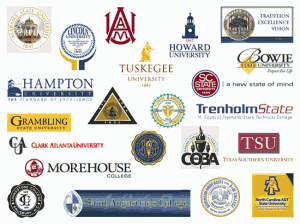(ThyBlackMan.com) If the United States is going to regain its global leadership position in higher education, Historically Black Colleges and Universities (HBCUs) will need to play a major role, says a White House official on education.
Just how the nation’s predominately Black institutions will participate in that objective was the main topic at a recent Southern Education Fund conference of HBCU presidents, held in Atlanta.
HBCUs are a critical component in President Obama’s national education initiative to restore the U.S. to its former ranking as the world’s leader in higher education, said John S. Wilson, Jr., executive director of the White House  Initiative on Historically Black Colleges and Universities.
Initiative on Historically Black Colleges and Universities.
“We have not been number one since 1995,” Wilson said during a media briefing with six HBCU presidents. “We need somewhere around eight million more graduates. Almost two million of them need to be African American, with roughly 200,000 coming from HBCUs.
“That is a big challenge,” he said. “That means we have to go from around 36,000 a year of graduates from HBCUs to somewhere north of 50,000 a year by 2020.”
Presidents in attendance at the media briefing included: Carlton Brown of Clark- Atlanta University, Beverly Hogan, of Tougaloo College, Walter Kimbrough, of Philander Smith College, Charlie Nelms, of North Carolina Central University, Mary Evans Silas, of Kentucky State University, and David Wilson, of Morgan State University.
Each college president agreed that HBCUs have a daunting task ahead of them, if those graduation goals are to be met.
According to the Council of Higher Education, 60 percent of all Black students attend a four-year college.
Of that number, HBCUs graduate about 17 percent of all Black students in the U.S.
“A segment that educates 17 percent of any group is pretty significant,” Kimbrough said. “We represent a significant portion of the higher education landscape. I am hoping… that we play a leadership role and become more aggressive in the agenda of completion rate of African American students because we’re the segment to do it.”
Black colleges need to be less defensive and show more what we are doing, Kimbrough added. Black colleges have not done the best job in telling their success stories, the college presidents agreed, arguing that HBCU graduates have gone on to contribute significantly to this nation.
“They contribute to society immensely as outstanding leaders and responsible citizens,” said Hogan, president of Tougaloo College in Mississippi. “America will not be able to maintain global competitiveness or even maintain national security without the products that we are turning out in our institutions.”
The presidents said they are beyond having the age-old, post-integration debate about whether or not HBCUs are still relevant. HBCUs are not one monolithic institution, they explained.
“We come to the table from different places,” Hogan said. “We don’t all look alike, but we all do one thing extraordinarily well – we provide access to opportunity for a broad array of students. We give them a chance to succeed.”
If HBCUs are going to be considered a serious partner in the Obama initiative, however, they must make some critical changes, said North Carolina Central University Chancellor Charlie Nelms said.
“We have to raise our standards, not just for students but for faculty, staff, presidents, chancellors and trustees,” Nelms said. “We have to hold ourselves to a higher level of accountability. We have to reform gateway courses. We have too many students who are not making it through their basic courses and they are not able to go on to their majors.”
Returning the U.S. to its premier educational status also is going to be tough, too, if a number of components of the educational process – including the nation’s troubled K-12 school system – are not re-evaluated, said Brown of Clark Atlanta.
“What we (HBCUs) do must be taken into context with a whole other set of national issues,” Brown said. “We are being beaten as a nation in producing scientists on the PhD level. We are being beaten in the way we position our scientists to innovate and translate those inventions into products and into businesses.”
“So in one sense, it is sheer folly to be talking about increasing the number of bachelor degree recipients,” he added, “without simultaneously talking about the rest of the agenda.” The college presidents also vowed to become more proactive in fighting efforts to eliminate or reduce funding for higher education on the state and federal levels.
They also applauded the Obama administration for fighting to defeat a Republican-led effort to cut funding for the Pell Grant program. Had that effort succeeded, thousands of Black college students would have been adversely affected, they said.
Written By Stan Washington
















Leave a Reply